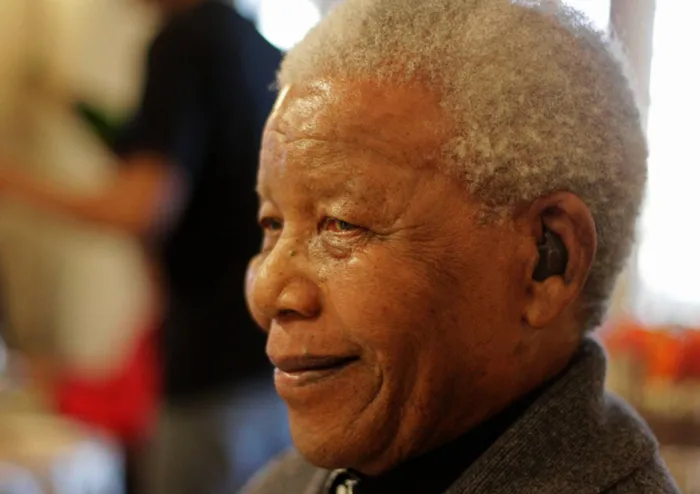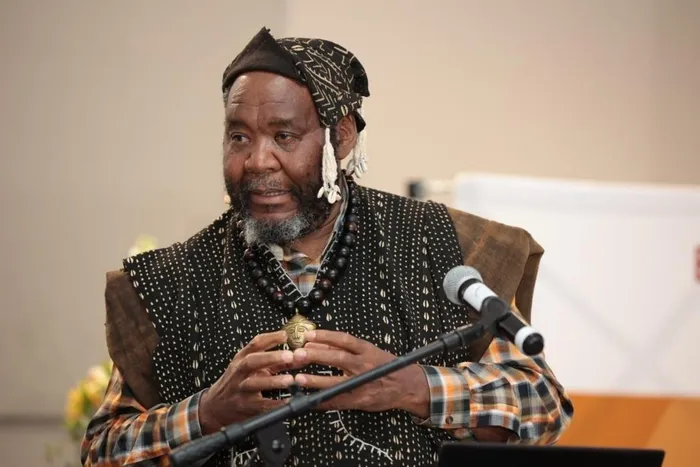
Dr Pali Lohohla was privileged to go and count President Nelson Mandela at his home in Qunu during Census 2011.
Image: File Image Independent Newspapers
General Nhlanhla Mkhwanazi’s report card of the 6th of July to the nation was not a statistical release of crime but one which discusses what the drivers of crime and how that plunges South Africa into what would be a failed state. This came 12 days before a globally acclaimed date on the global calendar which is Nelson Mandela Day – a euphoria in which South Africa could legitimately bask, but for reasons of neglect to memorialize we are unable to even if momentarily retire in this memorable vista.
Eleven years ago, I was privileged yet again to count the South African population. But this privilege was met with protestations by some communities in the country. Amongst the three that I had to spend time on was one by the residents of Silvertown, in Kwa-Sakhele in Ggeberha (Port Elizabeth). In the Twelfth Night Malvolio having been tricked into thinking Olivia thinks deeply about matters of the heart towards him fell for the line on greatness that Maria had laid as a trap for him. It read “some are born great, some achieve greatness and some have greatness thrust upon them.”
On the morning of 22nd of October 2011, I was privileged to go and count President Nelson Mandela at his home in Qunu during Census 2011. This rare privilege was possibly the last for Madiba to be publicly seen in relatively good health. What made the meeting profound was the extreme pain Madiba suffered by reading about the assassination of Muammar Gaddafi of Libya. Newspapers strewn across his table showed the bloodied and lifeless pictures of Gaddafi’s body.
My subsequent appearance in Silvertown, which was five days after meeting Madiba was met with major demands. The citizens of this township of corrugated iron dwelling structures, refused to be counted unless their councillor reports back and I was tasked with the responsibility of bringing the councillor to Silvertown from Gqeberha.
I argued that they themselves have such powers and I do not. But in the eyes of Kwa-Zakhele citizens, the public enlisting of President Mandela had thrust Malvolian greatness upon me. I refused to fall for the trap though, instead I offered to release the results of the Census of their township when they were out 12 months later. They then agreed to be counted with several conditionalities that would take the whole day to enlist and the space in this column does not allow.
Fourteen months later in December 2012, I reported back in Kwa-Zakhele to deliver the results. It was a statistical report on Kwa-Zakhele and it was not pretty at all. It revealed no new facts but when aggregated and contextualised with other places, they were bone gnawing and marrow sucking. I had been in the tin homes in 2011 when we did the count.
But the force of aggregation that said we all do not have regular running water, we all do not have toilet facilities and we all live in tin shacks, the message was potent. Within a short space of time Kwa-Zakhele had a Caterpillar cleaning and repairing the streets. Whoever was the council was driven by the numbers and the premier’s focus was on Kwa-Zakhele. This response is not the most favourable especially when the problem had long been coming but only triggered to be an emergency by being revealed.
Unfortunately public policy in South Africa has become an object of inconvenience where public outcry for services is seen as being the absence of gratitude, pointing at maleficence by the powerful is seen as being unpatriotic, grants, necessary as they are albeit a sign of governance failure are dangled in front of the poor as caring, lowering pass rate marks is seen as granting mercy to disadvantaged, introduction of maths literacy is considered as medicine for mathematics teaching defects, Two-Pot withdrawals system is seen as financial relief to the suffering working class and failing at the polls is seen as mandate and remembrance of the 1994 moment and justification and a reset for a national dialogue.
The national dialogue has long been in the making and Nhlanhla Mkhwanazi and the direct and sober way opposition parliamentarians responded to the budget of the Presidency is a clear indicator of the temperature and tempo of the national dialogue. The minister of defence correctly rebuked any thought of a coup d’etat by the minister in the presidency. South Africans are not about coup d’etat. They are just reminding us the elite about Amilcar Cabral's saying that, “Always bear in mind that the people are not fighting for ideas, for the things in anyone's head. They are fighting to win material benefits, to live better and in peace, to see their lives go forward, to guarantee the future of their children.”
In line with his Polokwane address of how we will remember those who paid with life and limb and I mention only two of the eight points then President Thabo Mbeki quoted from Madiba. He said, “Thirdly – the challenges of creating a people-centred society, of living up to the vision contained in the Freedom Charter, requires that all elements of South African society be subjected to genuine reconstruction and development. Fourth – that process of reconstruction and development will also have to encompass the spiritual life of the nation, bearing on the moral renewal of individuals and institutions, as well as the ideas and practice of a new patriotism.”
It is sad that at 31 years the South African Presidents in succession hardly refer to what a predecessor took on board. This nullifies the thought of continuity of change. It seems only Mbeki could quote his predecessor and has often done so with his successors as well. Absence of such points of reference to fellow statesmen in the form of critique or affirmation points to lack of continuity of plans.

Dr Pali Lehohla is a Professor of Practice at the University of Johannesburg, among other hats.
Image: Supplied
Dr Pali Lehohla is a Professor of Practice at the University of Johannesburg, a Research Associate at Oxford University, a board member of Institute for Economic Justice at Wits and a distinguished Alumni of the University of Ghana. He is the former Statistician-General of South Africa.
*** The views expressed here do not necessarily represent those of Independent Media or IOL.
BUSINESS REPORT